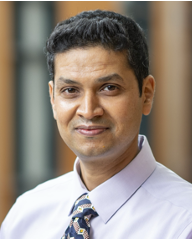Seminars
Prof. Ravindra Duddu
Department of Civil and Environmental Engineering
Vanderbilt University
Adaptive Finite Element Methods and Machine-Learning-Based Surrogates for the Phase Field Fracture Model

ABSTRACT: The phase field fracture model has emerged as a de facto computational approach, owing to its ability to simulate complex crack interface morphologies in 2D and 3D, including crack splitting and merging. However, the main challenge with applying the phase field fracture model to real case scenarios is the computational cost associated with resolving the diffuse crack interface. Adaptive finite element methods and machine-learning-based model surrogates offer the potential to enable accurate and efficient simulations. In this talk, I will first present our recent work on adaptive continuous/discontinuous finite element methods for phase field fracture simulations using strain-energy and stress based crack driving force functions. I will discuss the calibration and validation of these models with experimental data performed as a part of the damage mechanics challenge. Next, I will present a convolutional neural network (CNN)-based surrogate for the phase field fracture model that can predict damage/stress field given the microstructure. I will discuss the generalization of the surrogate model for predicting the fracture strength of fiber-reinforced composites and its potential for use in inverse design. I will conclude by discussing some applications of phase field models for glacier fracture and electrochemical corrosion.
BIOGRAPHY: Ravindra Duddu got his B. Tech in Civil Engineering from the Indian Institute of Technology Madras. He obtained his M.S. and Ph.D. in Civil and Environmental Engineering from Northwestern University. He worked as postdoctoral researcher at the University of Texas at Austin Institute for Geophysics and Columbia University in the City of New York. Currently, he is an Associate Professor of Civil and Environmental Engineering at Vanderbilt University, with secondary appointments in Mechanical Engineering and Earth and Environmental Sciences. His research interests are in computational solid mechanics with a focus on multi-physics modeling of material damage evolution. Ravindra Duddu is a recipient of the United States National Science Foundation (NSF) early CAREER award, Fulbright Kalam-Climate Fellowship, United Kingdom Royal Society International Exchanges travel award, and Office of Naval Research (ONR) Summer Faculty Fellowship. He is the Chair of technical committees on Computational Mechanics and Fracture and Failure Mechanics associated with the American Society of Civil Engineers (ASCE) and American Society of Mechanical Engineers (ASME).